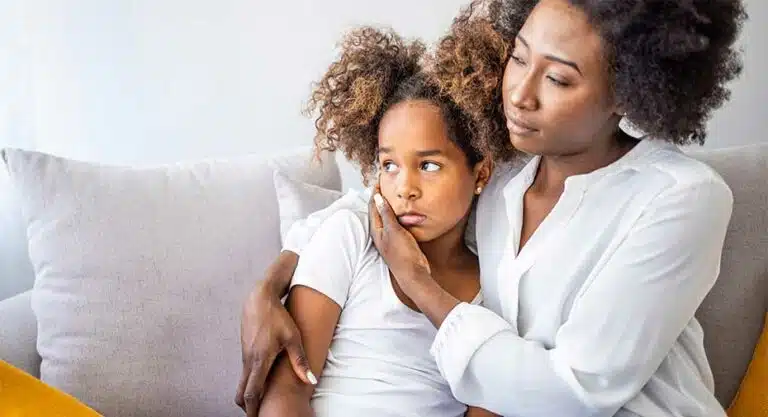Opioids Common Cause Of Child Poisoning

When you hear about the rise in opioid overdose deaths, you probably think of adults. Indeed, according to the Centers for Disease Control and Prevention (CDC), opioid painkillers have claimed hundreds of thousands of adult lives since the 1990s.
However, the drugs have also caused a surge in child poisoning deaths, especially in recent years.
Opioids & Fatal Child Poisoning
Opioids are a class of drugs that act as powerful pain relievers. They include prescription opioids like oxycodone (brand name OxyContin) as well as the illegal opioid heroin.
Because opioids are so powerful, they often cause fatal poisoning in young children who stumble upon the drugs and ingest them.
Increased Child Opioid Deaths
According to a new study published in the journal Pediatrics, opioids were responsible for 52% of fatal poisonings among children aged 5 and younger in 2018. In 2005, opioids were responsible for only 24% of such poisonings, meaning the rate more than doubled in 13 years.
The study was conducted by researchers from the Children’s Hospital of Philadelphia (CHOP). They examined data from the National Fatality Review-Case Reporting System, which reported 731 fatal poisonings in young children between 2005 and 2018.
How Did The Fatalities Occur?
Over two-fifths of these poisoning deaths involved children aged 1 or younger.
More than 65% took place at the child’s home, and nearly one-third occurred when the child was being supervised by someone other than a biological parent. Opioids caused most of these deaths (47%), followed by over-the-counter pain, cold, and allergy medications (nearly 15%).
Explaining The Surge
According to the researchers, opioid poisoning deaths among children declined in the early 2010s due to initiatives that decreased opioid prescribing rates.
However, the deaths then increased over the past ten years. This increase seems to be related to the rise of synthetic opioids such as fentanyl. Fentanyl is up to 50 times stronger than heroin. It’s extremely deadly for all age groups.
Ultimately, opioids likely caused even more child poisoning deaths than the study suggests. That’s because the researchers were only able to examine data from 40 states.
How To Prevent Opioid Poisoning Among Children
The study’s findings highlight the need for increased poisoning prevention efforts.
Some drug manufacturers have reduced accidental overdoses among children by using unit dose packaging. That means they package each opioid dose in an individual container. This strategy can prevent kids from accidentally ingesting entire bottles of opioids.
However, unit dose packaging is not available for all prescription opioids. It’s also not an option for the illicit opioid heroin.
Luckily, parents and caregivers can take other steps to prevent opioid poisoning deaths. In particular, they can get naloxone, learn the signs of opioid poisoning, store prescription drugs safely, and seek treatment for opioid use disorder if necessary.
Get Naloxone
Naloxone (brand name Narcan) is a medication that can quickly reverse the effects of an opioid overdose. It’s safe for people of all ages.
All parents and caregivers should consider getting naloxone, especially if they use prescription opioids or have substance use disorder. You can find it at most pharmacies without a prescription.
Learn The Signs Of Opioid Poisoning
The most common signs of opioid poisoning include:
- limpness
- vomiting or gurgling sounds
- pale, clammy, or bluish skin
- bluish lips and/or fingernails
- slowed or stopped breathing
- slowed or stopped heartbeat
- loss of consciousness
If your child experiences these symptoms, call 911 or head to the nearest emergency room right away.
Store Prescription Drugs Safely
Even if your medications have child resistant packaging, you should store them in locked containers out of a child’s reach. Remember to put your medication away after each use.
Also, avoid putting old or expired medications in the trash, toilet, or sink. Instead, contact your local government to ask about drop-off locations for unused medications.
In addition, never use your medication in front of your children. Kids will often imitate your behavior.
Make sure all family members, friends, and babysitters follow these same rules when around your children.
Seek Treatment For Opioid Use Disorder
Some child poisoning deaths involve the illegal opioid heroin. If you feel unable to stop using heroin, or if you use prescription opioids in a manner not prescribed, you may have opioid use disorder.
The most common symptoms of opioid use disorder are tolerance and physical dependence.
Tolerance means you need increasingly larger or more frequent doses of an opioid to feel the desired effects. Physical dependence means you experience withdrawal symptoms, such as anxiety and muscle aches, when you don’t use opioids.
To learn about our opioid treatment options, please reach out to an Ark Behavioral Health specialist. Our board-certified healthcare providers offer medical detox, behavioral therapy, and other evidence-based treatments to help you or your loved one stay healthy.
Written by Ark Behavioral Health Editorial Team
©2024 Ark National Holdings, LLC. | All Rights Reserved.
This page does not provide medical advice.
Centers for Disease Control and Prevention - Understanding the Opioid Overdose Epidemic
Children’s Hospital of Philadelphia - CHOP Researchers Find Rate of Fatal Opioid Poisonings Among Children More Than Doubled Over 13-Year Span
National Library of Medicine: MedlinePlus - Medicine safety and children
Pediatrics - Characteristics of Fatal Poisonings Among Infants and Young Children in the United States
Substance Abuse and Mental Health Services Administration - Opioid Overdose
Questions About Treatment?
Ark Behavioral Health offers 100% confidential substance abuse assessment and treatment placement tailored to your individual needs. Achieve long-term recovery.
100% confidential. We respect your privacy.
Prefer Texting?
Our friendly support team is here to chat 24/7. Opt out any time.







 Learn More
Learn More








